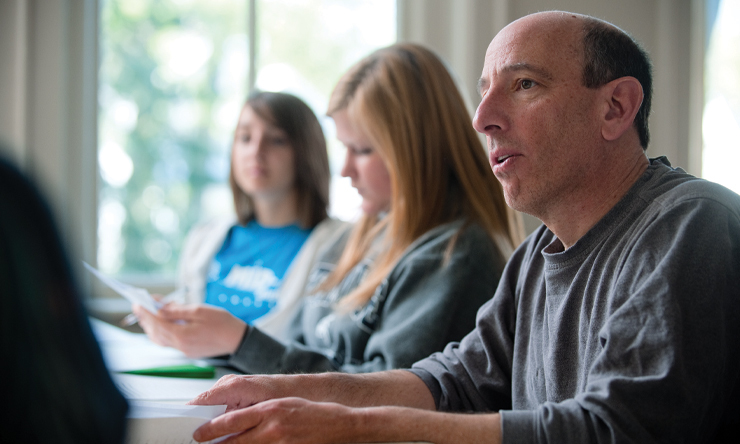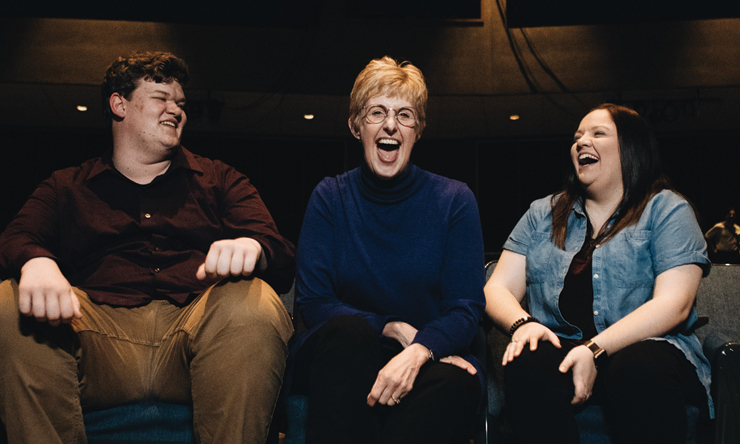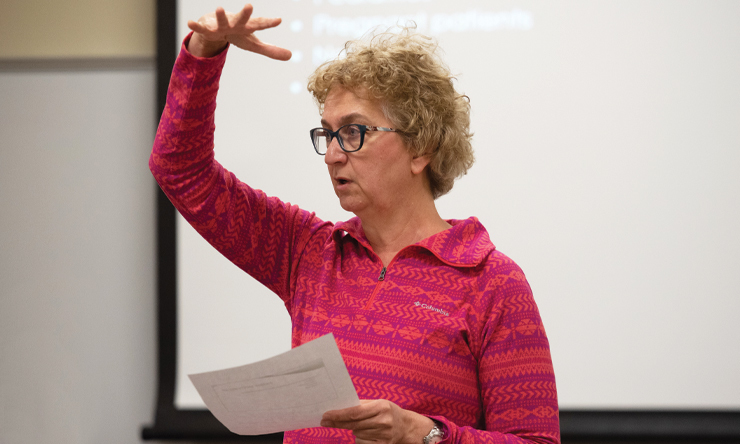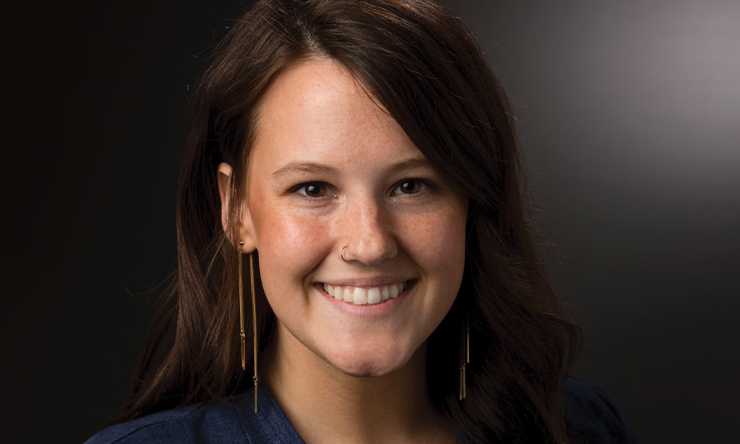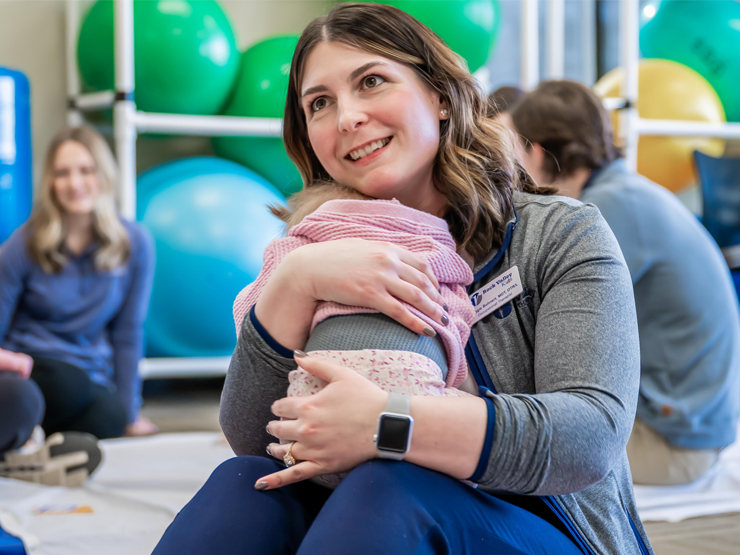Scene Magazine | Spring 2022
You can start with 289 combined years in St. Ambrose classrooms and learning labs, but that wouldn't account for the number of careers launched, lives shaped, communities impacted.
How many journalists have Donald "Duke" Schneider '76, MA, and Alan Sivell, MA, trained in nearly a combined century of teaching in the Communications and Digital Media Department? How many impactful stories have those journalists turned?
How many physical therapists, psychologists, and nurses have Kevin Farrell '84, PT, PhD, Barb Ehrmann '02 MPT, '07 DPT, Carol DeVolder, PhD, and Juleann Miller, PhD, RN, prepared to ease pain or even save lives?
How many actors and behind-the-scenes theatre production specialists were sent forth by Theatre Department faculty Corinne Johnson, PhD, and Kris Eitrheim, MFA, to entertain the masses, be it on the big stage or at a community theatre?
Gregory Bereskin, PhD, trained young financiers and economists. Carl Herzig, PhD, helped countless writers, poets and visual artists find their muse in the classroom and through the pages of Quercus. Ron Wastyn, PhD, helped future leaders grasp the power of adaptive change.
As happens annually, St. Ambrose University congratulates a number of talented and valued educators as they retire this year from remarkable careers dedicated to St. Ambrose students.
We checked in with this spring's iconic group of educators about their treasured memories and the classroom moments they'll miss. Select answers follow.
Q: Reflect on the reasons you became an educator many years ago and assess how the reality matched the expectation.
Juleann Miller: "I like to equip students and fellow nurses to be able to care for individuals in a knowledgeable, skillful and caring manner. I really like encouraging students to think about what they are doing and consider if there might be a different way of doing things for a better outcome. The reality of starting an academic career in nursing is that I was not prepared to be an educator. I have had to learn from many sources and others the art of teaching. And of course, I am still learning. That is what is so great about this career."
Carl Herzig: "Three things I don't think I could ever have expected: all the wonderful, deeply sustaining relationships that developed with students, many of whose lives remain interconnected with mine, my wife's, and our family's; that my teaching life, my career, could dovetail so seamlessly with – even nourish – my creative and spiritual lives; and that I, my family, and my students would be afforded such amazing opportunities to visit holy places, serve impoverished and under-served people, and make lifelong friendships around the world."
Barb Ehrmann: "When I was asked to do some teaching at St. Ambrose, I decided to give it a try. To my surprise, I found out that I loved it and eventually accepted a full-time position. What I realized is that every student I help to educate goes out and makes a difference in the lives of their patients. I have touched many more lives through my job in preparing future physical therapists than I ever could on my own."
Ron Wastyn: "I became an educator because of how important attending college was to me. I was the first in my entire family to attend and graduate college. That experience changed my life and I wanted to give back to the next generation."
Q: What will you miss most next fall?
Carol DeVolder: "I will miss the campus brimming with fall excitement. The old oak trees are beautiful and the campus is filled with students excited about their adventure. Faculty members are energized and contemplating what the new academic year will bring. The atmosphere is truly positive and engaging."
Alan Sivell: "The stimulation. I love discussing ideas, especially those concerning reporting, the "dreaded" media and the finer points of writing (putting every word in a sentence on trial for its life) with students. I never got tired of it. And, now I won't have a wave of young people to do that with or who will turn me on to the latest music or help me understand my iWatch."
Duke Schneider: "The very best thing about teaching at St. Ambrose was that I met wonderful people who came to me first as students and eventually became life-long friends. I'll miss getting into SAU ballgames and plays for free. But at least I'll be able to sit down and not have to shoot video."
Q: Describe a most gratifying interaction with a student, a moment when you knew, "Oh, they've got it."
Schneider: "There are so many moments like that. It's those moments that are the most rewarding. Students often want to thank me but I really just opened a door and tried to stay out their way."
Wastyn: "One special experience was when one of my undergraduate leadership students decided it was time for her to lead and engage her work teammates in how they needed to change to succeed. She told me it's unlikely she would have done so without the class."
Herzig: "Every time I hear from a student no longer in a writing class that they are still writing, or one from a lit class that they are still reading; or from an ex-student about a new program, fellowship, accomplishment, degree, job, marriage, or birth, or a poem or story they've just written."
289 Years
We checked in with this spring's iconic group of educators about their treasured memories and the classroom moments they'll miss. Select answers were included.
Q: What is a most important lesson you learned from a student?
Corinne Johnson: "It has taken me a long while to learn this, but students have helped me immeasurably to recognize that not everyone learns the same way and that very different things can serve as motivators. What motivates and inspires one student can shut down and discourage another. It takes being a good detective to find the right recipe for the right student."
Kevin Farrell: "They are people and want to just be treated as such. The quote: people don't care how much you know until they know how much you care."
Sivell: "I learn from students all the time, but I didn't realize how to do it until my wife put it in perspective. Some of the most important parts of our teaching at SAU takes place in our offices (Damn you, Covid!), with one-on-one conversations. Early on, Susan asked, 'How was your day?' and I answered that I couldn't get anything done since students kept stopping by my office to talk. I explained all we had discussed that day, both academic and personal problems. She stared at me and told me that it sounded to her like I had gotten a lot done. I realized, long before it became our slogan, that was the 'Ambrose Advantage.'"
DeVolder: "Perhaps the most important thing I've learned is how compassion can make a huge difference in someone's life. The student who is the first in their family to go to college struggles to find balance. The student who has lost a loved one will experience grief that interferes with school. The student who suffers from paralyzing anxiety will constantly be battling that demon. Students are people, professors are people, and together we make a learning team. Just as I've tried to be supportive to students, I've had many students reach out and support me during difficult times."
Q: Can you share a classroom moment you will laugh about years from now?
Johnson: "This was in the early 1990's and that semester I was teaching a Theatre History course. In those early days, I was still lecturing from my notes and often turning my back on the class to write on the whiteboard to better explain elements of my lectures. One day, dressed in my favorite calf-length circle skirt outfit, I ducked into the restroom just prior to class time. Returning, I forcefully and animatedly explored the Medieval Pageant Wagon playscripts while frequently jotting down names and sketching out stages on the whiteboard (back to the class remember). The class was 75 minutes in length. 75 minutes!! AFTER class, a very kind and quiet young theatre major pulled me aside to say, 'Ah, Dr. Johnson, I think that your skirt might be tucked into the top of your tights in the back.' Yep ... it sure was. I guess that explains the draft."
Greg Bereskin: "I was teaching a Managerial Economics class in Ottumwa as part of the SAU off-campus MBA program. This particular class had seven students in it. They were all graduate engineers trained at Iowa State University and working for John Deere. That by itself might not have been so unusual. However, the way they populated the classroom was. In the classroom, there were three rows of tables with chairs behind them and normally it would be expected that the students would spread out. But for this group of students, they chose to all sit in the middle row next to each other. This seating did not change throughout the extent of the course. I have never had another class where the students were "bonded together" as in this case. It was highly unusual and certainly memorable."
Q: How did St. Ambrose change you for the better?
Wastyn: "I remember Dr. Rogalski discussing what made SAU unique was that we out-care the competition. I will never forget that. Caring for each other as unique people is the cornerstone of what makes us Ambrosians. We must capture that in these difficult times."
Herzig: "Helped me learn not to be attached to the fruits of my actions. Helped me learn patience, tolerance, compassion."
Sivell: "I'm certainly smarter now than I was. And much more empathetic. I've spent the last 35 years reading good books and being surrounded by a lot of very intelligent people with a wide variety of viewpoints, both students and teachers (not bad for a guy who was put on academic probation his freshman year). I don't know if this is a good thing or a bad thing, but the years flew by. I only looked at the clock to check if I needed to leave for class or to see if I could squeeze in one last point before the end of a class before I began hearing the zipping of students' backpacks."
Q: How will you remain "Ambrosian" in retirement?
Miller: "I hope to continue serving others. I am not sure what that next chapter will look like but I look forward to discerning where I am needed and where I can make a difference in helping others to have opportunities and chances to succeed in life."
Schneider: "I'll be around. I will definitely come to plays, ballgames, and concerts. And I will stay in touch with the decades of alums and colleagues who make up my Ambrose family."
Ehrmann: "St. Ambrose will always hold a special place in my heart. My time here has enriched my life and I hope to continue to be able to enrich the lives of others. I plan to find ways to serve in my church and community, and maybe even make a guest appearance as a mock patient for future DPT students."
Editor's note: Rev. Brian Miclot, PhD, '70 a member of the Philosophy Department for 28 years, retired in December, and Kerry Humes, PhD, Master of Physician Assistant Studies completed six years with SAU and will retire this spring.
Share This Story


